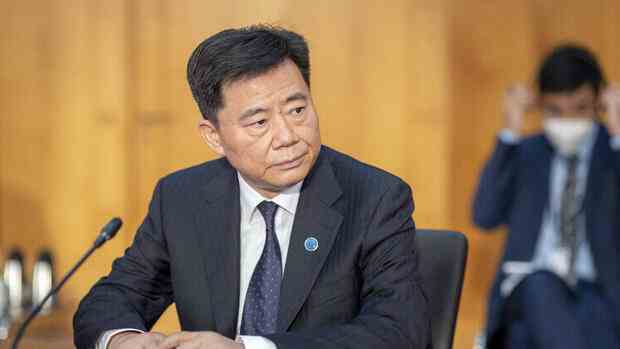“More than two years ago, the SPD parliamentary group called for the realignment of China policy in a position paper, and there are also clear statements on this in the traffic light coalition agreement,” said Nils Schmid, foreign policy spokesman for the SPD parliamentary group, to the Handelsblatt. “In this respect, the criticism of the Chinese ambassador is somewhat surprising.”
Wu had accused the federal government of giving the impression that the draft of the new China strategy, which has been published so far and which is to be adopted in 2023, was “mainly guided by ideology”.
In addition, the Chinese diplomat criticized that the competition and a confrontation between the two countries was “hyped up” in such a way that it had nothing to do with reality. He expressed the suspicion that the German government was losing its independence and was instead following the USA in matters of China policy.
According to Schmid, the draft to which the ambassador is referring is several months old and the final version is far from being completed. “But in contrast to China, where the state-controlled media would certainly not publish comparable criticism from foreign ambassadors, the Chinese ambassador here has the opportunity to do so uncensored,” says Schmid.
>> Read here: Things are getting uncomfortable in German-Chinese relations. A comment
This shows that despite all the willingness to cooperate on both sides, the systemic competition between China and democratic states is “unmistakable”.
Jürgen Trittin, foreign policy spokesman for the Greens in the Bundestag, made it clear that the German federal government must redefine its China policy against the background of a change in policy in China.
“It has a lot to do with realism and little to do with ideology,” Trittin told Handelsblatt. “I would advise Mr. Wu Ken to await the voting process in the federal government before making any pithy statements.”
German China policy is made in Germany, not in Beijing. Reinhard Bütikofer, head of the EU Parliament’s China delegation
Reinhard Bütikofer was even clearer: a Chinese ambassador who declares that the human rights situation in his country is better than ever cannot be taken seriously, said the head of the EU Parliament’s China delegation. In addition, Wu Ken loses credibility by mercilessly glossing over his government’s “chaotic COVID-19 policies.” “It’s ridiculous that such an ideologically stubborn person then accuses others of ideology,” Bütikofer told the Handelsblatt. “I would answer him: Shoemaker, stick to your last. German China policy is made in Germany, not in Beijing.”
Hard criticism of the FDP
The FDP also criticized the ambassador for his statements. “Wu Ken’s answers show how fundamentally differently the People’s Republic of China interprets liberal guiding principles and thus robs them of their core ideas, such as a free market economy, entrepreneurial freedom, human rights and multilateralism,” Gyde Jensen, deputy chairman of the FDP parliamentary group in the Bundestag, told the Handelsblatt.
This alone means that Germany needs a comprehensive China strategy “to document for everyone, especially the People’s Republic of China, how we understand all these principles and concepts and what we can derive from them as an action or rule”. This also includes the question of how Germany understands the one-China policy with regard to Taiwan.
>> Read here: FDP politicians arrive in Taiwan
A high-ranking delegation of FDP members of the Bundestag is currently visiting Taiwan. Jensen himself had already traveled to the island last year. China reacted angrily to the trip on Monday.
The Chinese government regards Taiwan as part of its territory, even though the island was never part of the People’s Republic founded in 1949, has its own democratically elected government and its own laws, and polls of the population repeatedly say that they are against a merger with China. In the country itself and in the West, there is a growing fear that Beijing could one day take over Taiwan by force.
China has expanded its military maneuvers in the region in recent years. According to a survey by the AFP news agency, 1,727 Chinese military aircraft entered Taiwan’s air defense zone last year, up from 380 in 2020.
“We have to expect harsh reactions”
Also on Sunday, 28 Chinese military planes entered Taiwan’s air surveillance zone (ADIZ), according to the Defense Ministry in Taipei. The ministry announced that these “provocative actions” continued on Monday.
Experts expect the tone from Beijing to become even rougher. Sebastian Heilmann, China professor at the University of Trier and founding director of the Berlin China think tank Merics, believes that China will increasingly try to prevent western countries from realigning China policy in a coordinated manner in the coming years.
“We have to reckon with harsh reactions from China to a German ‘go-it-yourself China strategy’ – not only with diplomatic counterfire, but possibly also with targeted sanctions and campaigns against selected German companies or sectors,” Heilmann told the Handelsblatt.
He therefore advises “at least a small, hard core of principles and priorities of a new China strategy to be coordinated within the EU as bindingly as possible and to communicate with China collectively”.
More: Interview with China’s Ambassador in Berlin: “Cold War mentality”
